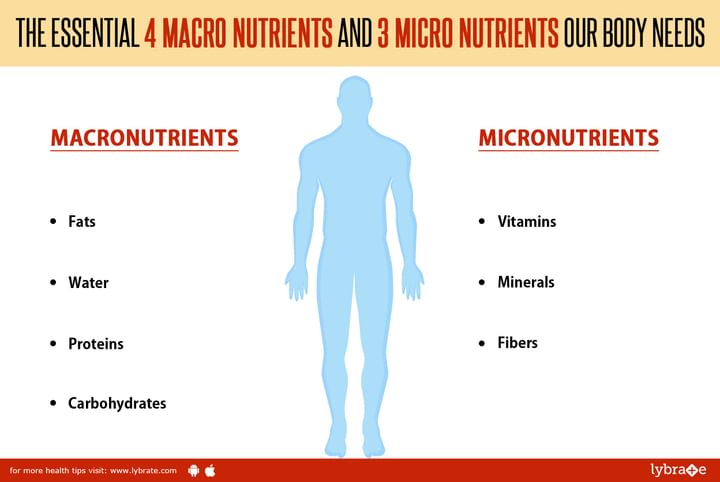Get the App
For Doctors
Login/Sign-up
Last Updated: Aug 29, 2019
BookMark
Report
The Essential 4 Macronutrients and 3 Micro Nutrients Our Body Needs
Types of Nutrients Your Body Needs
To keep our body functioning, we need different types of nutrients from our diet. These nutrients are mainly classified into two types: 1. Macro nutrients 2. Micronutrients
Macronutrients are the nutrients which are required in large amounts and micro nutrients are required in smaller quantities.
Macronutrients
1. Carbohydrates: Carbohydrates are the main source of energy in our body. Starch, fructose, glucose etc are examples of different carbohydrates. The sources of carbohydrates are grains, bread, fruits, and starchy vegetables.
2. Proteins: Proteins, also known as body building blocks, are essential for repair and maintenance different tissues like bones and muscles. Pulses, meat and eggs are the sources of proteins.
3. Fats: Fats are of two types, saturated and unsaturated. Saturated fats are synthesized in our body thus we need not to obtain it from external sources. Excess intake of saturated fats result in many health problems like high BP, high cholesterol, heart problems, obesity etc. Unsaturated fats, also called essential fats, are not produced in body and thus have to be included in our diet. Unsaturated fats are available in plant sources and some types of fishes.
4. Water: Our body is about 70% of water. We need water for different functions like metabolism, transportation etc.
Micronutrients
1. Vitamins: Vitamins are vital amino acids. They are of two types: Fat soluble and water soluble. Fat soluble vitamins (A, D, E, and K) can be stored in the body with the fat reserves. Water soluble vitamins (B complex and C) are lost easily with the body fluids and must be replenished on regular basis.
2. Minerals: They are the essential chemicals required in very small quantities for very vital body functions. They assist in our body’s metabolic system. Calcium, potassium, iron, zinc etc are the examples of minerals which can be obtained from different food and supplements.
3. Fibers: Fibers are indigestible nutrients present in mainly plant based food. Fiber rich diet prevents constipation and improves bowel movements. It also helps in reducing bad cholesterol and diabetes.
Fruits and vegetables are sources of micronutrients.
If you would like to consult with me privately, please click on 'Consult'.
To keep our body functioning, we need different types of nutrients from our diet. These nutrients are mainly classified into two types: 1. Macro nutrients 2. Micronutrients
Macronutrients are the nutrients which are required in large amounts and micro nutrients are required in smaller quantities.
Macronutrients
1. Carbohydrates: Carbohydrates are the main source of energy in our body. Starch, fructose, glucose etc are examples of different carbohydrates. The sources of carbohydrates are grains, bread, fruits, and starchy vegetables.
2. Proteins: Proteins, also known as body building blocks, are essential for repair and maintenance different tissues like bones and muscles. Pulses, meat and eggs are the sources of proteins.
3. Fats: Fats are of two types, saturated and unsaturated. Saturated fats are synthesized in our body thus we need not to obtain it from external sources. Excess intake of saturated fats result in many health problems like high BP, high cholesterol, heart problems, obesity etc. Unsaturated fats, also called essential fats, are not produced in body and thus have to be included in our diet. Unsaturated fats are available in plant sources and some types of fishes.
4. Water: Our body is about 70% of water. We need water for different functions like metabolism, transportation etc.
Micronutrients
1. Vitamins: Vitamins are vital amino acids. They are of two types: Fat soluble and water soluble. Fat soluble vitamins (A, D, E, and K) can be stored in the body with the fat reserves. Water soluble vitamins (B complex and C) are lost easily with the body fluids and must be replenished on regular basis.
2. Minerals: They are the essential chemicals required in very small quantities for very vital body functions. They assist in our body’s metabolic system. Calcium, potassium, iron, zinc etc are the examples of minerals which can be obtained from different food and supplements.
3. Fibers: Fibers are indigestible nutrients present in mainly plant based food. Fiber rich diet prevents constipation and improves bowel movements. It also helps in reducing bad cholesterol and diabetes.
Fruits and vegetables are sources of micronutrients.
If you would like to consult with me privately, please click on 'Consult'.



+1.svg)
